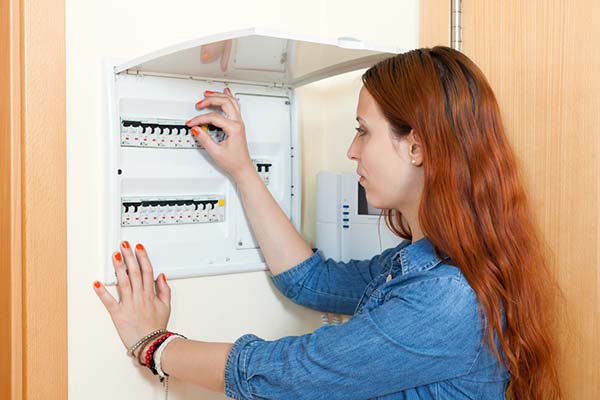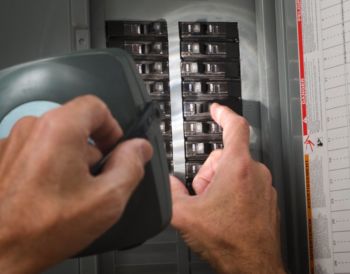What Causes Your Circuit Breaker to Burst
Circuit Breakers are electrical components designed to protect us against the risks of electric shock and our homes against fire and other types of damage that can be caused by electrical faults. Each circuit breaker in your electrical switchboard typically protects one or more related circuits against overload, short circuit and earth leakage.
There are only 3 very simple reasons why circuit breakers trip:
Overloaded Circuits – The Main Reason a Circuit Breaker Trips
Have a look around your house at all the socket outlets. How many appliances are plugged into each socket outlet? Chances are you’ve got more than the circuit is designed for. Our increasing use of electrical and electronic devices puts more pressure on our electrical installations every day – sometimes to the point where the amount of electricity we use exceeds the amount that the circuit can safely give us without overheating or getting damaged. When this occurs, the circuit breaker in your switchboard will disconnect the circuit from the electrical supply.
Short Circuits – When Things Go Really Wrong
Whether you’re digging in the garden for the great new flower box, or drilling a hole in the wall to put up that lovely family picture, each time you make changes to the house you run the risk of damaging electrical cables concealed behind walls or in the soil. When you drill a hole through a cable or cut it with a spade, direct contact occurs between the individual wires in the cable. This is known as a short circuit. Electrical cables are not designed to withstand the current flowing in such a short circuit situation. In cases such as this, the short-circuit protection mechanism in the circuit breaker disconnects the electricity supply to ensure that the cable does not melt or catch fire.
Earth Leakage Currents
Sometimes known as ground fault current or residual current, this is electricity that flows from the electrical installation to the ground or other conductive materials of the house. Electrical systems are designed to pass current between the live conductors of the installation. When appliances like kettles, refrigerators and washing machines become faulty, they can allow current to flow through their metal parts into your body and down to the ground. This is a dangerous situation known as an earth leakage. Certain types of circuit breakers known as Residual Current Devices or Ground Fault Current Interrupters trip when they detect this current flowing to the ground to protect you from electric shock.

How Can I Tell If My Circuit Breaker Has Gone Bad?
You may think it’s gone bad, but circuit breakers trip to protect you from electrical issues short circuit, overloaded circuit) that could cause fires. So first we want to rule out these common problems before jumping to the conclusion that the breaker is faulty.
Step 1: Identify what circuit the breaker is protecting
Go to your circuit breaker panel and look for one of these 2 things:
- A label next to the breaker that’s tripping
- A sheet on the circuit panel’s door
These will tell you what circuit this break is protecting.
Once you know that, you need to…
Step 2: Unplug all electrical devices on that circuit
You want to rule out the case of an overloaded circuit (a circuit that has more amps flowing through it than it can handle). So unplug lamps, TV components, computer components and the like that are on that particular circuit.
Step 3: Reset the circuit breaker
When you flip the breaker, you should hear a definite click. If the switch flops back and forth and there is not definite “on” or “off” position, the breaker is probably bad.
How Do You Know If a Circuit Breaker Has Tripped?
If power has gone off in a certain area of your home rather than all over the house, the problem may be a tripped circuit breaker. Electrical circuits of your home are protected by either circuit breakers or fuses. All homeowners should know the location of their electrical panel or fuse box, and the opening should be easily accessible and not blocked by shelving, boxes or furniture. If each circuit breaker or fuse isn’t already labeled, take the time to identify each switch or fuse and the particular area it controls. This will save you time and effort if a circuit or fuse trips/blows. If there are two breakers or fuses for one area, such as the kitchen, take care to detail which part of the kitchen each of the two switches controls. For example, you might label one switch “kitchen appliances” and the other switch “kitchen counter outlets” or other designations as appropriate.
If a circuit breaker trips because it has exceeded its maximum amperage, the switch handle will have moved between the on and off position and may show a red area alerting you that it has tripped. Depending on your electrical panel, sometimes the “trip” causes only a slight movement of the handle, and you’ll have to look closely at the switches to discern which one has tripped.
Circuit Breaker Warning Signs
We care about maintaining the value of your home, so make sure you’re aware of these circuit breaker warning signs:
1. Burning Smell in the Electrical Panel
One way to tell if you need a circuit breaker replacement is to sniff around and see if you smell a burning odor coming from the panel. If so, that means the wires and insulation have become overheated. Ultimately your circuit breaker is failing to protect your home from an electrical short elsewhere. Shut off the main power to the house immediately and call an electrician for an emergency service before it’s too late.
2. Breaker Will Not Remain Reset
After several months of resetting your circuit breaker, it might seem like it won’t stay on for a period of time. Boom, warning sign number two. This means the circuit breaker has failed, so hire an electrician to check the entire circuit. He’ll be able to diagnose it and ensure no further damage was done to the wiring.
3. Physical Damage
Seeing scorch marks around your circuit breaker, outlets, or other electrical appliances? Then that means the wiring has melted and failing. There’s a good chance your electrical panel breaker needs immediate service. A melted wire is one bad step away from your whole home lighting on fire. Call an electrician immediately and unplug all fixture from that circuit breaker.
4. Breakers Tripping Frequently
If it seems like every time you turn on an electrical appliance, your circuit breaker starts tripping, then you’re dealing with an outdated breaker. Circuit breakers are designed to trip when too much power is being drawn through it. It’s very frustrating dealing with a tripping circuit breaker. Each time you turn on your microwave or vacuum, you’ll find out immediately whether your breaker is tripping and if it’s ready to fail. Call an electrician who will determine whether it’s a bad breaker or if you need to add a circuit to your home.
5. Old Age
Another warning sign of a failing circuit breaker is simply if it’s too old. Circuit breakers are supposed to last for decades. However, if you’re regularly checking your breaker or haven’t had it inspected in a while then it could very well be failing without you knowing it. Having an electrician inspect your panel is a wise investment, especially for those of you who haven’t done so in the past 10 years…

Ground Fault
A particular type of short circuit, a “ground-fault,” occurs if a hot wire comes in contact with a ground wire or a metal wall box or touches wood framing members. Ground faults can be especially dangerous when they occur in areas with high levels of moisture, such as kitchens or bathrooms, or in outdoor locations. A ground fault carries a definite risk of shock.
There are steps you can take to identify and fix a ground fault, but also essential steps you should take to prevent one from occurring in the first place. For example, in areas where direct contact with the ground or water is possible, building codes may require that outlets be protected with GFCIs (ground-fault circuit interrupters).
As with hard shorts, a ground fault causes an instant reduction in resistance and an immediate increase in electrical flow. This causes the internal mechanism of the circuit breaker to heat up and trip. As with hard shorts, if a ground fault is present, the circuit breaker may trip again immediately after you reset it.